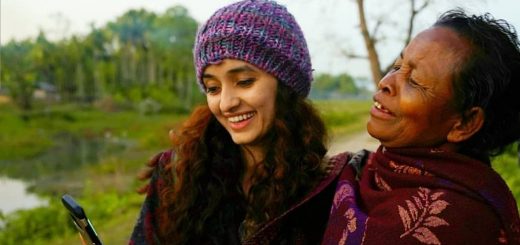Beyond Rape Shock – Are we feeding or fighting the oppression?
By Namita Kulkarni on 13 June 2014
Like we never saw it coming. That time of the month/week/day when again – yet again – we recoil in a collective spasm of shock over: Yet. Another. Rape. Until the next one comes along in all its gory details and a cold slap to any idea of progress we thought we’d made. This intermittent indignation has been playing on loop for a long time now. We clearly have a tremendous capacity for shock. Maybe it’s time we anointed a particular ‘Day’ for it – a National Rape Shock Day – in the trend of assigning ‘Days’ to things that are as worthy of emphasis every other day but get a concentrated dose of limelight one arbit day. So the rest of the 364 days we can go back to our usual business of mindlessly creating and contributing to the context in which these brutalities happen. Feeding female subjugation in a thousand ways both blatant and subtle, without the repetitive intervals of shock every now and then. Saving for that one ‘special’ day all our frustrated anger, debates, marches, protests, editorials, hashtags, what-have-you and maybe, if time permits, even the odd introspection of whether we’re keeping our side of the street clean while condemning the obvious depravity of the crime in question. Whether we’re doing everything (or even anything) in our individual capacities to be part of the solution instead of the problem. Or do we ourselves fuel the forces that oppress women and then get ‘shocked’ when that oppression takes the form of yet another rape? Like arms dealers lamenting the scourge of war and wondering what went wrong.
In a picture that speaks more than a thousand gruesome words, two girls hang dead from a tree after being raped by village goons. Punished for being female and powerless, in a godforsaken village where gender equality is perhaps the most laughable concept imaginable. Given that backdrop, their lives must have been doomed the second their chromosomes went the xx way, the odds stacked immensely against them every minute of their short lives. And then there are women like me who live in cities, with our own bank accounts, opinions, voices, rights, roles, education, skills, careers, smartphones, the internet, and most importantly – a far greater array of choices than was ever available to the women before us. All the rape shock begs the question why so much female oppression still exists at all in 2014. But the more urgent question is – On which side of the fence are we when it comes to our own subjugation as women? Not just in terms of words and opinions, but in the full weight of our individual actions and choices.
Our actions are our loudest messages to society, and through many of them, we cast a vote either for or against female subjugation. In an election which cannot be rigged, and whose results are the everyday circumstances we live with. As thinking adults, we have a responsibility to think before we cast that vote. Keeping our side of the street clean may be only the base camp in our ascent to empowerment, but it’s the least we can do. Let the record reflect that this generation of grown women, alive and kicking in 2014, to the very best of their ability, refused to perpetuate their own subjugation. Can we take responsibility where it is due and recognize our part in our slice of history? Can we choose agency over victimhood? What are the many ways in which we perpetuate our own subjugation? There are many, but here are a few that come to mind:
1. Do we question traditions that undermine women, human intelligence and gender equality?
Are we defying traditions that grew out of regressive beliefs or are we blindly following them? If one wishes to follow such traditions, one may well choose to do so, but these choices are better made consciously, rather than blindly. Because blind conformity requires no thought and is an insult to our own intelligence. So let’s spare a thought to the message sent out by the choice, in the clear knowledge of one’s stand towards gender equality. When educated urban women comply with a tradition of the bride touching the groom’s feet at weddings, they vote in favour of the idea that the woman ought to be subservient to the man. Same goes for rituals such as ‘Kanyadaan’ which in their very name treat women as property to be passed from one man’s ownership to another’s. Aren’t we signing our approval on the dotted line of the chauvinism contract when we go along with these regressive ideas? Let’s question before following, if we at all wish to follow tradition.
2. Are we still shy/embarrassed about menstruation, in even the slightest way?
Do we get our sanitary napkins wrapped in black covers when we buy them? Do we use ‘code words’ for periods and napkins because it might ‘gross out’ someone? Do we feel repulsed by a basic female biological process that ensures the continuation of the human race? Most girls are taught to be extremely discreet and even ashamed of their periods, with any visible blood stain on their clothes being the ultimate mortification in any social setting. When the very first thing that marks their entry into womanhood is something to be shrouded in secrecy and hushed tones under layers of shame and embarrassment, what are we telling them about all the womanhood in store for them? All the trying-to-look-real bloodshed in the glorified violence filling movies and video games is a badge of masculine strength, but the very real and natural menstrual bleeding is somehow an embarrassing weakness of the ‘weaker’ sex. Can you imagine the kind of big deal all that blood and clot would be if it happened to men for five days every month? They’d be bragging about the size of their bluetooth-enabled tampons after their paid menstrual leaves, with egos a tad bigger from all that recent bleeding and hurting. And the PMS would be off the charts. Without any help from this bloody, monthly ordeal, the male of the species has been the vastly more criminal, violent and aggressive half of the population, so a guy poking PMS-themed fun and derision at women is quite like a barely literate ignoramus mocking Shakespeare for his grammatical ‘errors’.
3. Do we tolerate the use of derogatory references to women and women’s bodies?
Apart from being blatantly derogatory and diminishing, words like ‘chick’, ‘slut’, ‘spinster’ and ‘barren’ are fundamentally sexist, having no corresponding male equivalents. Until the bizarre day when, in equal measure, men are likened to fragile clueless poultry, demeaned instead of lauded for their promiscuity, stigmatized instead of being envied for staying unmarried well beyond a certain age, and denounced for their infertility, these words will reek of double standards stacked against women. The closest male ‘equivalents’ of ‘slut’ of course are ‘legend’, ‘stud’ or ‘casanova’, because don’t you know, sexuality is a badge of honour on men but a stamp of shame on women. It’s quite telling that the male equivalent of ‘spinster’ being ‘bachelor’ evokes a far more colorful and radiant image than the stereotype of the ‘crazy cat lady’.
Totally jarring and incongruent to any notion of gender equality, such words need to be retired ASAP before they get passed down another generation. Forever.
4. Do we establish our autonomy before we even start thinking of matrimony?
Do we wait till we get to know ourselves a good deal and establish ourselves financially, or do we walk into marriages where our financial and emotional dependence on the man is a given? A dependence that could well hold us hostage to an unhappy marriage for decades, apart from holding us back from exploring our own potential. Can we get through our lowest lows on our own mettle or is that not worth exploring because it’s simpler to turn ourselves over to the charge of another human? Do we find security in our own strength or do we look for it in the manmade institution of marriage? Do we proactively choose the men in our lives or do we wait to be chosen? Do we have a life of our own before we start to ‘share’ it with another? Have we forged our own identities and decided our purpose on the planet or is being a ‘Mrs So-and-so’ gratifying enough? Do we feel complete in and of ourselves or is being someone’s ‘better half’ going to complete us? Do we define ourselves primarily by our marital/relationship status without considering how much more there might be to us and life? Do we commit to a lifelong companionship out of our own beliefs or out of insecurity and a need for society’s permission slip? Do we walk into marriage with our eyes closed or open, and do we give up our autonomy once we marry?
5. Do we procreate out of choice or conformity?
Contary to as-yet prevalent medieval mindsets, reproducing is not part of the job description of being female. Men aren’t needled about when they plan to ‘have kids’ a fraction as often as women are. Having the biological apparatus for procreating doesn’t mean we’re obliged to use it and somehow cook up a maternal instinct when we’d rather not. If there is any part of the body whose use ought to be made mandatory, it is the brain. Wouldn’t we be way less self-destructive and much less over-populated if all the emphasis placed on the reproductive faculties was placed on the thinking faculties instead? As Bertrand Russell once observed – most people would rather die than think, and most people do. To paraphrase in the context of our massive over-population, most people would rather procreate than think, and most people do. Parenthood is the ‘logical’ next step after marriage in a conformity-driven society, rather than the careful weighing of the responsibilities it entails. And women who choose not to have kids are bizarrely deemed ‘selfish’ and ‘abnormal’ women who will one day regret missing out on all the ‘magic’ that biological motherhood supposedly is. If we could just bear in mind, for one minute, the extent of our rampant overpopulation, we would be hyperventilating in panic at the thought of another baby wailing into the world.
As the astute Caitlin Moran put it: “In the 21st century, it can’t be about who we might make, and what they might do, any more. It has to be about who we are, and what we’re going to do.”
6. Do we accept ‘entertainment’ that objectifies and dehumanizes women?
From video games to pornography and even mainstream movies, women are mostly objectified while the men get to be humans or even superhumans. Made primarily for and by misogynistic men, women are rarely portrayed as ‘people’ or thinking adults. If we disapprove of dehumanization then such forms of entertainment have to be rejected and its consumers shamed for their misogyny and ignorance, even and especially when they happen to be the men in our own lives. ‘Boys will be boys’ is no excuse. It’s like saying ‘neanderthals will be neanderthals’, absolving men of any responsibility towards their attitudes and choices. As thinking adults in 2014, do we really have the time/patience/energy/inclination for tolerating neanderthals? Let’s shut down the rape jokes and creepshots (pictures taken, generally of a woman, without her knowledge/consent) and question the acceptability of entertainment that demeans women. Because few things reflect who we are as accurately as our choice of entertainment. Whether it’s a man or a woman enjoying or performing in such ‘entertainment’, s/he adds to the dehumanization with every bit of time, money and energy they put towards it. The victims of which needn’t only be thought of as ‘someone’s mother, sister, or wife’ but as ‘someone’ in themselves – human beings in their own right.
7. Do we respect our bodies enough to never judge them on the media’s or anyone else’s narrow definitions of beauty?
Or do we grimace at our reflections from every angle, pinching what we self-diagnose as ‘extra flab that needs to go’. The ruthless scrutinizing and self-loathing doing more damage than any ‘extra flab’ could. Wanting to have a ‘sexy’ body rather than a healthy one. Judging our health by the number on a weighing scale instead of getting well-informed about our bodies and its workings. Caring more about the ‘glamour’ of our shoes than the discomfort/pain of the feet in them. Guilt-tripping over a meal that was enjoyed to the last bite instead of appreciating that capacity for enjoyment.
And as the years go by, do we try to expand our appreciation of ourselves or do we keep trying to squeeze ourselves into old narrow ideas of what we should look like? Do we want to look good first and foremost in our own eyes or in the eyes of others whose validation we need in order to feel good about ourselves? Do we change our appearance because we enjoy doing so or out of a need to pander to society’s ideals of beauty?
Do we play right into the hands of entire industries dedicated to making women feel inadequate for being humans in a real world and not made-up vacuous faces in magazines? Let’s not forget that our bodies are the one tangible piece of the universe that is truly ours all our lives, and just for that they are worthy of more care than criticism.
8. Do we recognize sexism when we see it and do we call it out?
Or have we grown so accustomed to it that we don’t stop to notice it, much less call it out. A simple way to check for sexism is to swap the genders. If it seems ridiculous and/or laughable, then there’s your damning evidence on a platter. Such as women in social gatherings being well-dressed and ‘groomed’ to within an inch of their lives, while the men show up looking like they just stumbled out of the jungle, sometimes with ear hair intact, and yet taken seriously and respected more than the women.
9. Are we proud of our age or is it something we’d rather hide in accordance with society’s ageism?
Why are women presumed to ‘deteriorate’ as the years go by, while the men mostly get more ‘distinguished’, ‘experienced’ and ‘seasoned’? Why is there a youth-obsessed ‘shelf-life’ mindset about women in particular? As if fertility and youth form the USP of a woman. Why do movies so often have actors cast opposite girls half their age and yet rarely the reverse? Why is it ‘rude’ to ask a woman her age? Because women are judged far more negatively on their age than men are? In which case, isn’t that kind of judgement the ‘rude’ thing and not the question in itself? And have we ourselves bought into the regressive mindset there when we conceal our age? Being anti-age is not far from being anti-life, because the only way you can skip your next birthday is by not getting there alive, or slipping into a coma. Women should be brandishing their ages as they get older, not lying about it or hiding it. It is a cause for pride in itself – having punched through and survived another year as a woman in a patriarchal society such as ours especially, where men are free to pee on the roadside but women have to think twice before stepping out in sleeveless clothes or without pepper spray in the handbag.
If we are going to contribute to our own subjugation, individually and/or collectively, let’s at least be self-aware, out of respect for our own intelligence if nothing else. Instead of blindly feeding the forces lined against us, and getting caught unaware like deer in the headlights, it would serve us to be mindful of our own agency and not feel like helpless victims after we’ve fuelled our own oppression in any extent.
That said, the onus lies not only on women but equally on men, because these are crimes against humanity and we live together, not in separate water-tight compartments. Though the perpetrators are predominantly male and the victims/survivors most often female, it is not a battle of the sexes. The battle lines are not between men and women but between actions that feed female subjugation and actions that oppose it. Actions that have both men and women behind them, in ways both mindful and mindless.
I’ve heard it said that ‘rapes happen in every country’ as if that somehow justifies or normalizes its occurrences here and makes us look not-so-bad in comparison. But there’s a person behind every number in every statistic and even one rape is one too many. We can’t beat the oppression while still feeding it. Are we going to fight it with the full weight of our individual actions and choices, or are we going to keep feeding the already over-fed oppression? Before we get ‘shocked’ by the next rape and its depravity, let’s be really sure which side we are on.
Featured on http://www.womensweb.in/2014/07/which-side-are-you-on-nine-questions-every-woman-must-ask-herself/





I want to add a word to list of “should be forever retired” : Mrs. or Missus.
Please, it has to go.
Yes Aruna I think so too …some may want to be identified that way and they can choose it, but it shouldn’t be the default.
So many well observed details of our society… seriously biasing has become such a stigma in our society.. few points felt while reading it
1. These crimes have been happening for decades, but neither the media reached it, nor highlighted it under pressure, though we feel sad n shocked by it, but atleast it is being revealed, n conscious people in their way of protests, governance, votes, blogs will make sure that this stops, sooner or later.
2. Points of females being treated with negative term for the same thing guy gets a positive (Slut/Casanova) was simply spotless, surprising this happens not only in our society in India but every country around, don’t know why. The menstruation part is exactly pointed out.
3. Suggest you go for some Indian tradition & Mythology before 1000 AD, it had been drastically different and been very very open to each aspect about, age, body parts even menstruation of women, it was only after Muslim rule of 600 odd years, the Indian traditions changed what we see today..
Great work.. 🙂
Thanks Shivendra. Regardless of the history of Indian tradition and mythology, the fact that they’re blindly followed in this day and age is a big part of the problem. And all the protests and highlighting by the media will not change things unless our individual actions and choices point towards empowerment instead of subjugation.
Powerful stuff. well written.
Thank you Andy!
Love the bit about procreation! So well put! And this is true for countries and populations around the world, not just India!
Thanks Anu! And yes, given the world’s 7.1 odd billion (and counting) population it’s true for countries around the world
Wow! This riveting article has got hard facts clothed in humor. Great read Namita
I look forward to more of your articles.
Thank you Chitra!